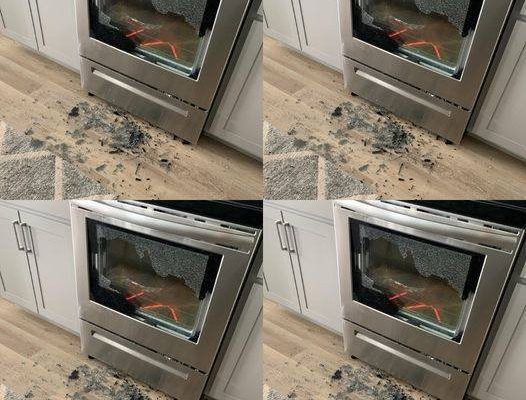The Glass Used in Oven Doors and Its Limitations
Most oven doors are made from tempered soda-lime glass or, in some high-end models, borosilicate glass. Tempered glass is designed to withstand extreme heat and pressure and is processed to break into small, pebble-like pieces instead of dangerous sharp shards. Borosilicate glass, on the other hand, is even more durable and better at withstanding temperature fluctuations. However, neither type of glass is immune to breaking.
The primary reasons for shattered oven doors are glass imperfections and thermal stress. During the manufacturing process, microscopic flaws can form in the glass. One of the most common imperfections is nickel sulfide inclusion, a tiny impurity that can remain dormant within the glass for years. These inclusions are unpredictable but can become active during periods of high heat—such as during a self-cleaning cycle, where temperatures can reach 900°F (480°C) or higher. When this happens, the glass can weaken and shatter without warning.
Thermal stress is another major cause of breakage. Glass expands and contracts with temperature changes, and when it experiences rapid fluctuations—like placing a cold dish on a hot oven door or spilling cold liquid onto hot glass—it can crack or shatter. These stresses build up over time, and even minor damage or hairline cracks can weaken the structural integrity of the glass.
Common User Mistakes That Increase the Risk of Shattering
In addition to natural imperfections and thermal stress, certain user behaviors and habits can increase the likelihood of an oven door breaking. These include:
- Using abrasive cleaning tools: Scouring pads, steel wool, and harsh chemical cleaners can scratch the glass surface, creating weak spots.
- Placing heavy objects on the oven door: Using the door as a makeshift countertop or resting heavy pots and pans on it can exert excess pressure on the glass.
- Temperature shock: Pouring cold water on a hot oven door or placing frozen dishes directly onto hot glass can create thermal shock, causing fractures.
- Improper door alignment: A misaligned oven door can create uneven pressure points on the glass, weakening it over time.
How to Prevent an Oven Door from Shattering
Fortunately, preventing an oven door from shattering is relatively simple and often involves basic maintenance and mindful use. Here are some key tips to protect your oven door:
- Handle with care: Avoid slamming the oven door shut. Close it gently to reduce unnecessary stress on the glass.
- Use soft cleaning tools: Stick to soft sponges or microfiber cloths when cleaning the glass. Avoid abrasive tools or harsh chemical cleaners that could scratch the surface.
- Avoid sudden temperature changes: Never place frozen dishes on a hot oven door or splash cold water onto hot glass surfaces. Gradual temperature adjustments are safer.
- Do not overload the door: Avoid placing heavy pots, pans, or other items on the oven door, whether it’s open or closed.
- Check door alignment regularly: Ensure the door is properly aligned and that the gasket is intact to prevent uneven pressure points.
- Limit self-cleaning cycles: While the self-cleaning feature is convenient, frequent high-heat cycles can stress the glass. Clean manually whenever possible to reduce wear.
Understanding Spontaneous Glass Shattering
Spontaneous shattering, while rare, can still happen even when all precautions are taken. Glass imperfections, especially nickel sulfide inclusions, are difficult to detect during manufacturing. Over time, these microscopic flaws can cause the glass to fail unpredictably. However, by following proper handling and maintenance practices, you can significantly reduce the likelihood of this happening.
It’s also worth noting that oven door glass is designed to shatter safely. When tempered glass breaks, it fractures into small, rounded pieces instead of sharp, jagged shards. While this reduces the risk of injury, cleaning up shattered glass can still be a hassle and requires caution.
What to Do If Your Oven Door Shatters
If your oven door glass shatters, the first step is to ensure your safety. Wear gloves and carefully clean up the glass fragments, as they can still cause cuts despite their rounded edges. Avoid using the oven until the door has been inspected and repaired or replaced by a professional technician. Using an oven with a damaged door can lead to heat escaping, inefficient cooking, and even further damage to the appliance.
If your oven is still under warranty, contact the manufacturer for assistance. Many manufacturers cover glass breakage under warranty if the door fails without user misuse.
The Bottom Line: Prevention Is Key
While a shattered oven door might seem like a random event, the causes are often traceable to glass imperfections, thermal stress, or improper use. By adopting careful handling practices, using gentle cleaning methods, and avoiding sudden temperature changes, you can extend the life of your oven door glass and prevent costly accidents.
Modern oven glass is built to be resilient, but it isn’t indestructible. Treat it with care, follow the manufacturer’s maintenance guidelines, and stay mindful of how you use your appliance. These small efforts can go a long way in preventing your oven door from turning into a pile of glass fragments on your kitchen floor.
In the end, awareness and routine care are your best tools for ensuring your oven door remains intact and functional. With these precautions in place, you can continue to enjoy cooking, baking, and roasting without the fear of an unexpected glass explosion.



